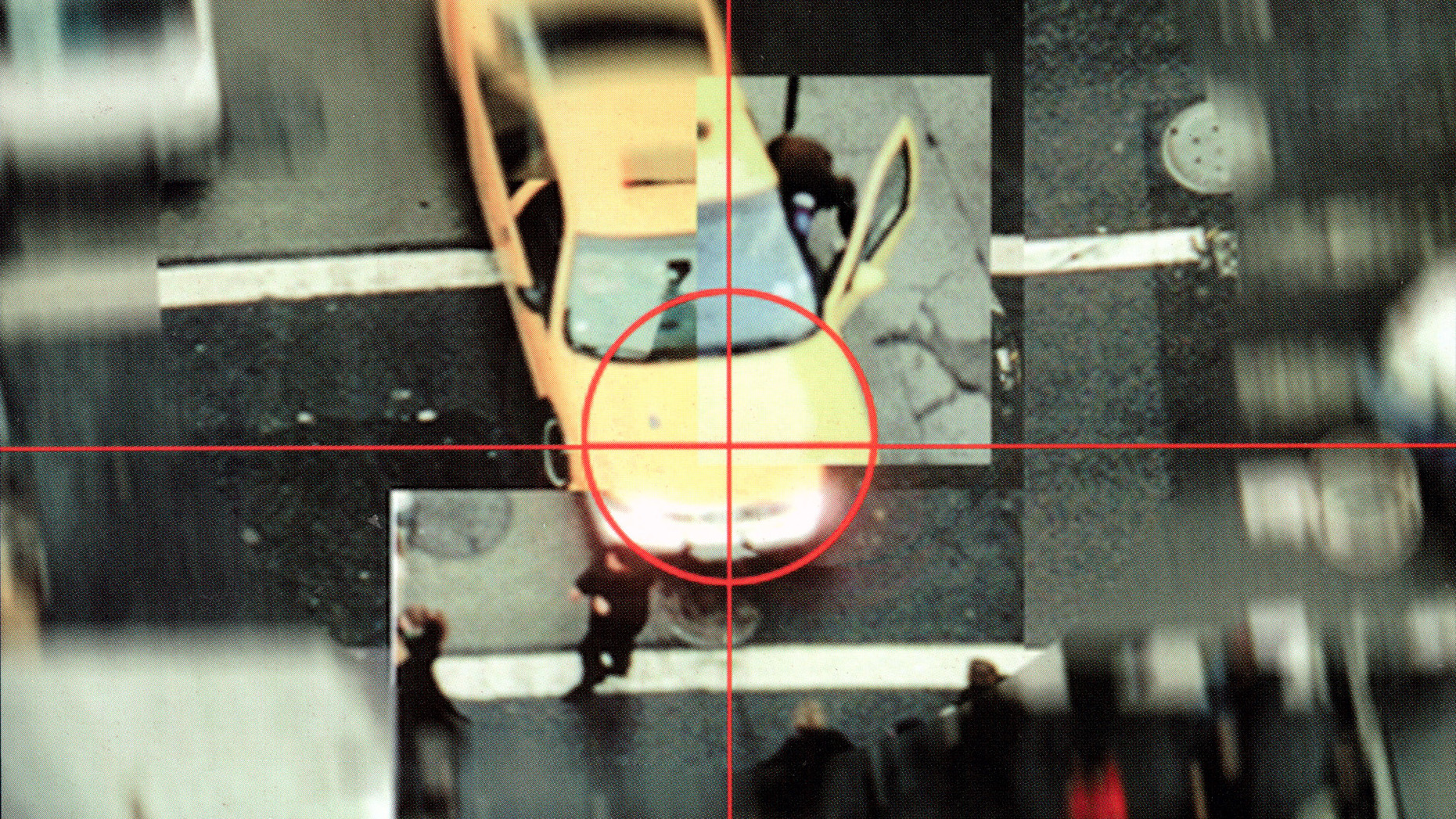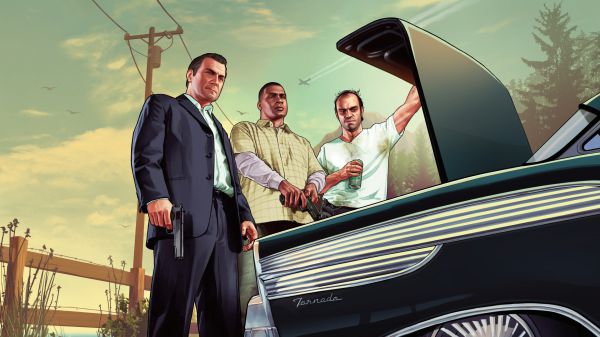Before Grand Theft Auto's radio became iconic, it was a fight just to get it in the game
How the scrappy audio team at DMA Design implemented a feature no one wanted and helped make GTA a phenomenon.

It's hard to imagine the Grand Theft Auto series without its radio stations. The radio doesn't just provide a steady stream of music while running a red light or crashing into the nearest postbox. It delivers a flavour of what the world is like without the player around, bombarding the listener with satirical advertisements and bizarre talk radio shows that are always seconds away from going off the rails. They've been a key part of Grand Theft Auto since the very first entry in 1997, but they almost didn't make it into the game at all. In the beginning, GTA's radio stations were actually the result of an audio team experimenting against their employers' wishes.
I had this idea of creating almost like a mini-Motown Records here in Dundee
Colin Anderson
Colin Anderson is the person you have to thank for bringing radio to Grand Theft Auto. A member of the sound department at DMA Design (Grand Theft Auto's original developers), Anderson came up with the idea when speaking to Craig Conner, a musician working on the first GTA. Conner had been developing demos for the game in a wide-range of musical genres and Anderson knew that they would likely need to scrap two-thirds of them when they settled on a singular style.
To unify the various genres into something coherent and save the tracks, Anderson suggested separating them by genre and creating different radio stations for each style of music.
"It was when I said 'If only we could get radio stations in it'—it was his reaction," Anderson explains. "Seeing him say 'That would work, that would be really cool,' that was the moment. But it took a long time after that… We had to start with, how would a radio station work in that world? And that's when I realized—it would work even better if we put them in the cars."
The introduction of radio "changed everything," according to Anderson. Prior to this, the soundtrack was going to be MIDI-based, an unfortunate by-product of the plans to simultaneously release on N64 in addition to PC and PlayStation. But when the N64 port was cancelled and the radio feature was introduced, the team took advantage of the CD-quality sound to replicate real-life radio stations more closely.
Although some within the studio welcomed this decision with open arms, it wasn't universally popular. Audio, at the time, wasn't high on DMA Design's list of priorities.
Anderson remembers the sound team feeling especially motivated to do a great job on the first Grand Theft Auto. "As a department within DMA Design [we wanted] to have a calling card, a showcase of what we could do with sound and music in video games. Then I don't have to go and have the same argument that I have to have every time we start a project with a producer and a lead programmer about how we're getting no memory budget, no processor budget, and we're not allowed to have any storage space, whether it's on a cart or whether it's a CD or whatever."
The biggest gaming news, reviews and hardware deals
Keep up to date with the most important stories and the best deals, as picked by the PC Gamer team.

How to make money in GTA Online
The fastest cars in GTA Online
The best GTA 5 mods
GTA 5 cheats
GTA 6
GTA casino guide
Ironically, it was that typical lack of interest that gave the team the buffer to eventually be able to make radio stations work. During the development of Grand Theft Auto, DMA Design moved the audio department into what Anderson now refers to affectionately as not "quite the broom closet, but it wasn't far off that." This environment allowed them to develop ideas for the radio without much oversight.
The ideas for advertisements and radio DJs both sprung from those broom closet brainstorming sessions, though neither appeared until the sequel due to memory and budget issues.
"It was out of sight, out of mind," says Anderson. "We could do pretty much anything we wanted to over there, so a lot of experimentation happened because of that." The additional time also gave them the chance to win over the rest of the team, too.
Grand Theft Auto featured seven radio stations in total, with stations divided into hip hop, funk, pop, rock, country, house, and drum 'n' bass. All of these were made up of entirely original compositions from DMA's musicians, with Anderson deciding to make the absence of licensed music a core tenet of the series. Though this was fine for the first game, after Grand Theft Auto released and the radio feature proved an overwhelming success with fans, that idea wouldn't last.
In between GTA and GTA 2 there was a noticeable change in attitude towards the radio, with the studio willing to invest more in the idea. During GTA 2's development, DMA Design's publisher Rockstar had its Canadian studio Rockstar Toronto make two London-based expansions for the original game: GTA London 1961 and GTA London 1969. These games were made without Anderson's involvement and featured licensed music from musical acts such as The Upsetters and Harry J All Stars.
Those bands would do a lot of vital worldbuilding for the '60s settings, at the expense of diluting DMA Design's original vision of GTA being set in a parallel universe that was distinct from our own. More importantly for Rockstar, the radio became a powerful marketing tool. Reviews praised the role of the radio in establishing the tone. A reviewer for Eurogamer claimed the radio added "to the dodgy atmosphere of the game" while the reviewer for IGN commended the "great big dose of late '60s British music."
"That essentially broke the purity of the creative vision," says Anderson. "I was kind of upset about that at the time, because I didn't know anything about those products. They appeared from nowhere."
Ultimately it boiled down to a difference of opinion: Rockstar's co-founders on one side, Anderson and the music department on the other. While the co-founders Sam Houser and Terry Donovan were keen on licensing a number of existing bands for Grand Theft Auto to try to raise the status of the games, Anderson instead wanted to utilize GTA as a platform to distribute new, local music, in response to the declining fortunes of the record industry in the late '90s.
"It was going to be much longer term and that was a bridge too far," Anderson explains. "I had this idea of creating almost like a mini-Motown Records here in Dundee, [Scotland] where we're using local talent. We're finding people who are creating shit-hot music. Kind of as a vehicle to regenerate the city and help the local creative scene. But that just never flew."
Anderson didn't entirely get his way with GTA 2, but it only used a few licensed songs. And its commercials and DJs played a huge part in developing the series' satirical voice, with adverts such as 3rd World Bank enticing rich business owners to invest their money in harmful industries abroad to protect their money from a financial collapse. Another for a nasal wake-up spray called Zoom Zoom marketed a cocaine alternative to tired workers.
The film and television director Michael Keillor was responsible for writing these ads at DMA Design. Despite not being involved with future games, you can see Keillor's influence on GTA 3, such as in the Eiris Running Shoes ad from that game, which satirized American companies using child labour to make sneakers. Both took an irreverent look at real issues through exaggerated talk radio.
At the time, Grand Theft Auto 2 received mixed reviews for sticking too closely to the original. But it earned a lot of praise for its radio and sound effects. Dean Austin at IGN, for example, wrote at the time that the radio "is a very nice device to interject different styles and mood and compliment the environment. It's also pretty entertaining as you get not only music stations but also talk radio and commercials... Here, the music is a unique tool to encourage gamers to simply search out new vehicles just to see what's playing on the radio."
Anderson left Rockstar Games after work on Grand Theft Auto 2 finished and pre-production for Grand Theft Auto 3 was underway. By the time he left, he said he had achieved most everything he wanted to with radio stations, from establishing the core experience on GTA and introducing radio hosts and advertisements in its sequel. He decided letting a new team take over allowed the series to go in an exciting new direction with the same level of enthusiasm as when he began.
Speaking to him today, he doesn't seem to regret it. He's happy for the role he played in fighting for radio and the mark he's left on the series as a result.
"The chance that anyone gets to work on a project that has such a big impact on so many people—so few people get a chance to do that in their lives and to have had a chance to do that it is an incredible privilege," says Anderson. "I'm really glad that I and other people who were around at that time stepped away from GTA because I don't think it would've become the huge franchise that it has."

